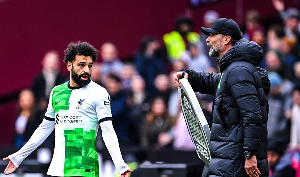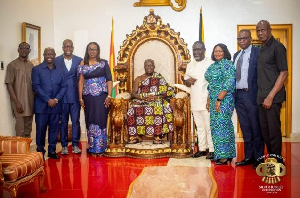- Home - News
- TWI News | TV
- Polls
- Year In Review
- News Archive
- Crime & Punishment
- Politics
- Regional
- Editorial
- Health
- Ghanaians Abroad
- Tabloid
- Africa
- Religion
- Election 2020
- Coronavirus
- News Videos | TV
- Photo Archives
- News Headlines
- Press Release
General News of Friday, 5 May 2006
Source: --
Ghana Favours Diplomatic Solution to Iranian Nuclear Issue
Ghana?s UN envoy Nana Effah-Apenteng told reporters yesterday that a binding U.S.-backed, Franco-British draft resolution demanding a halt to Iran?s uranium enrichment ?went further than we expected?, an apparent reference to a threat to consider unspecified ?further measures? at a later stage to ensure compliance.
``It has gone further than we expected,'' Effah-Apenteng said of the draft. ``We are looking at diplomatic means to resolve the conflict.''
The new draft resolution's reference to the authority of Chapter 7 of the UN Charter, making compliance mandatory, has produced the most concern. That provision of the Charter authorizes steps ranging from economic and diplomatic sanctions to armed force. The text expresses the Security Council's ``intention to consider such further measures as may be necessary to ensure compliance'' by Iran.
Envoys from Security Council non-prmanent members Qatar, Tanzania, Ghana and the Republic of the Congo said questions about the use of Chapter 7 need to be resolved. Others complained that the U.S., U.K. and France were pushing them too hard for a quick decision.
Tanzanian Ambassador Augustine Mahiga said the African envoys have requested a meeting with the resolution's sponsors to respond to questions about its legality under international law.
China and Russia immediately said they would oppose the resolution, and envoys from the Security Council's 10 elected member governments - including Ghana - said today that their concerns made quick action unlikely.
Ambassador Oswaldo de Rivero of Peru said negotiations would probably take at least as long as the three weeks needed for the agreement on a non-binding Security Council statement adopted on March 29.
De Rivero complained about the ``manner they treat us,'' and said the council's elected members would be ``mute'' at a meeting today because they haven't had time to assess the resolution.
Meanwhile, Iran has rejected the resolution, as diplomats forecast difficult negotiations over a measure that might lead to military action.
``It is extremely unhelpful and won't get anywhere,'' Iranian Ambassador Javad Zarif said. ``Iran does not respond to threats and intimidation. This draft indicates the intention of those who drafted it to create a crisis where none is needed and an atmosphere of tension our region does not need.''
The U.S., U.K. and France yesterday circulated a draft resolution that ``calls upon Iran without further delay to take the steps required by the International Atomic Energy Agency Board of Governors which are essential to build confidence in the exclusively peaceful purpose of its nuclear program.'' It demands that Iran ``suspend all enrichment-related and reprocessing activities, including research and development.''
The U.S. suspects Iran plans to build a nuclear bomb, while Iran says its program is for generating electricity.
Zarif said Iran suspended enrichment activities for two years and ``nothing happened.'' Still, he said, Iran was ``prepared to move forward with transparency, and for a negotiated solution.''
U.S. Ambassador John Bolton said that while the draft doesn't set a deadline for Iranian compliance, he wanted to see a report from the IAEA in 14 days.
Bolton told reporters today that it was a ``very straightforward resolution that should not require a lot of negotiation.'' Bolton said envoys would work ``24-7,'' including over the weekend, to reach agreement that would lead to adoption of the measure on May 8.
``I hope all parties will bear in mind that the only solution is going to be a negotiated one, and I would also urge the Iranians to back away a bit from their defiant posture,'' UN Secretary-General Kofi Annan told reporters.










